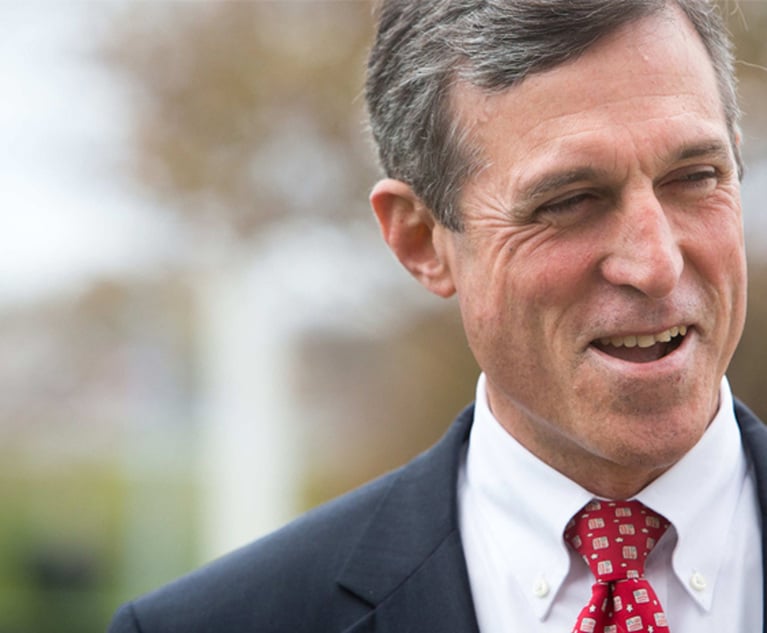District Court Nominations Set Up Administrative Decisions
With President Donald Trump's nomination of Colm Connolly and Maryellen Noreika to serve on Delaware's district court, the state's federal bench is finally poised to return to full strength, after a year in which the shorthanded court saw a steep rise in patent filings.
December 28, 2017 at 08:00 AM
3 minute read
The original version of this story was published on Delaware Law Weekly
 Shutterstock
Shutterstock
With President Donald Trump's nomination of Colm Connolly and Maryellen Noreika to serve on Delaware's district court, the state's federal bench is finally poised to return to full strength, after a year in which the shorthanded court saw a steep rise in patent filings.
However, if confirmed, the U.S. District Court for the District of Delaware would still face the administrative challenge of phasing out a slate of visiting judges in favor of its two newest members.
Connolly and Noreika, both experienced intellectual property litigators, are widely seen as quick studies who were selected in part for their ability to quickly dive into their new workload. But the timeline for a confirmation vote remains murky as lawmakers return from their winter recess.
The U.S. District Court for the District of Delaware has been operating with two judicial vacancies, since U.S. District Judges Sue L. Robinson and Gregory M. Sleet announced in early 2017 that they would be taking senior status. Robinson has since retired, while Sleet has continued to manage his own docket.
Meanwhile, the court saw patent filings nearly double in the second part of the year after the U.S. Supreme Court's May decision in TC Heartland v. Kraft Foods Group Brands limited venue-shopping in patent litigation, causing Chief Judge Leonard P. Stark to enlist a roster of visiting judges to help handle the growing caseload.
Those developments created a renewed sense of urgency for Delaware's Democratic senators, Chris Coons and Tom Carper, who relayed their concerns to White House Counsel Don McGahn, tasked with overseeing judicial selection.
According to sources familiar with the process, Coons and Carper interviewed six candidates and recommended Connolly, a Republican, and Noreika, a Democrat, for the posts. By October, the administration had agreed to nominate both attorneys for the post.
But the announcement lagged until the Senate on Dec. 20 passed a sweeping tax-reform legislation, seen as one of the key initiatives during the first year of the Trump administration, sources said. Hours later, Connolly and Noreika were included in Trump's ninth wave of judicial nominations.
Now, the focus turns to how quickly Noreika and Connolly will be able to begin their work on the court.
Sources said hearings for the nominees could begin as soon as mid-January, and a subsequent vote before the full Senate is expected to be largely noncontroversial. From there, sources said Noreika and Connolly would likely be sworn in quickly with a formal investiture to follow later.
It would then be up to Stark to decide how to reassign cases from approximately a dozen visiting judges to Noreika and Connolly.
Since Robinson's retirement, about one-quarter of all new civil cases have been assigned to a vacant judgeship docket, which is initially handled by the district's three magistrate judges. Upon the filing of case-dispositive motions, those cases have been reassigned to visiting judges, mostly from Pennsylvania's Middle and Eastern districts.
All new criminal cases have gone to Stark, Sleet and U.S. District Judge Richard G. Andrews, who also split a “full and equal share” of the court's civil docket, according to a Sept. 22 announcement from Stark.
Stark did not respond to questions last week seeking comment on the nominations or how he planned to handle the transition administratively.
This content has been archived. It is available through our partners, LexisNexis® and Bloomberg Law.
To view this content, please continue to their sites.
Not a Lexis Subscriber?
Subscribe Now
Not a Bloomberg Law Subscriber?
Subscribe Now
NOT FOR REPRINT
© 2025 ALM Global, LLC, All Rights Reserved. Request academic re-use from www.copyright.com. All other uses, submit a request to [email protected]. For more information visit Asset & Logo Licensing.
You Might Like
View All



Trending Stories
- 1The Appropriate Exemption in Students for Fair Admissions v. President & Fellows of Harvard College
- 2DOJ, 10 State AGs File Amended Antitrust Complaint Against RealPage and Big Landlords
- 3New Partners at Cummings & Lockwood, Carmody Torrance Sandak & Hennessey
- 4'Extra Government'?: NY Top Court Eyes Ethics Commission's Constitutionality
- 5South Texas College of Law Houston Selects New Dean
Who Got The Work
Michael G. Bongiorno, Andrew Scott Dulberg and Elizabeth E. Driscoll from Wilmer Cutler Pickering Hale and Dorr have stepped in to represent Symbotic Inc., an A.I.-enabled technology platform that focuses on increasing supply chain efficiency, and other defendants in a pending shareholder derivative lawsuit. The case, filed Oct. 2 in Massachusetts District Court by the Brown Law Firm on behalf of Stephen Austen, accuses certain officers and directors of misleading investors in regard to Symbotic's potential for margin growth by failing to disclose that the company was not equipped to timely deploy its systems or manage expenses through project delays. The case, assigned to U.S. District Judge Nathaniel M. Gorton, is 1:24-cv-12522, Austen v. Cohen et al.
Who Got The Work
Edmund Polubinski and Marie Killmond of Davis Polk & Wardwell have entered appearances for data platform software development company MongoDB and other defendants in a pending shareholder derivative lawsuit. The action, filed Oct. 7 in New York Southern District Court by the Brown Law Firm, accuses the company's directors and/or officers of falsely expressing confidence in the company’s restructuring of its sales incentive plan and downplaying the severity of decreases in its upfront commitments. The case is 1:24-cv-07594, Roy v. Ittycheria et al.
Who Got The Work
Amy O. Bruchs and Kurt F. Ellison of Michael Best & Friedrich have entered appearances for Epic Systems Corp. in a pending employment discrimination lawsuit. The suit was filed Sept. 7 in Wisconsin Western District Court by Levine Eisberner LLC and Siri & Glimstad on behalf of a project manager who claims that he was wrongfully terminated after applying for a religious exemption to the defendant's COVID-19 vaccine mandate. The case, assigned to U.S. Magistrate Judge Anita Marie Boor, is 3:24-cv-00630, Secker, Nathan v. Epic Systems Corporation.
Who Got The Work
David X. Sullivan, Thomas J. Finn and Gregory A. Hall from McCarter & English have entered appearances for Sunrun Installation Services in a pending civil rights lawsuit. The complaint was filed Sept. 4 in Connecticut District Court by attorney Robert M. Berke on behalf of former employee George Edward Steins, who was arrested and charged with employing an unregistered home improvement salesperson. The complaint alleges that had Sunrun informed the Connecticut Department of Consumer Protection that the plaintiff's employment had ended in 2017 and that he no longer held Sunrun's home improvement contractor license, he would not have been hit with charges, which were dismissed in May 2024. The case, assigned to U.S. District Judge Jeffrey A. Meyer, is 3:24-cv-01423, Steins v. Sunrun, Inc. et al.
Who Got The Work
Greenberg Traurig shareholder Joshua L. Raskin has entered an appearance for boohoo.com UK Ltd. in a pending patent infringement lawsuit. The suit, filed Sept. 3 in Texas Eastern District Court by Rozier Hardt McDonough on behalf of Alto Dynamics, asserts five patents related to an online shopping platform. The case, assigned to U.S. District Judge Rodney Gilstrap, is 2:24-cv-00719, Alto Dynamics, LLC v. boohoo.com UK Limited.
Featured Firms
Law Offices of Gary Martin Hays & Associates, P.C.
(470) 294-1674
Law Offices of Mark E. Salomone
(857) 444-6468
Smith & Hassler
(713) 739-1250






